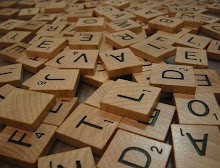TIPS AND TOOLS
Our SCRABBLE experts offer tips anyone can use to improve
your game!
Points vs. Leave
Sometimes making the most points in SCRABBLE isn’t as
important as what you leave on your rack. Think about the letters you’re
leaving behind. Are they high point tiles that don’t combine well together, or
are you close to being able to make a bingo? Sometimes, playing fewer letters
in SCRABBLE can help you get the tiles you need to make the big play. And at
other times, playing a longer word with a lower score gives you the opportunity
to refresh your rack, drawing tiles that could breathe life back into your
game.
When to go back to the bag
Most casual SCRABBLE players don’t ever exchange their
tiles, but it can be to your benefit to refresh your rack. If you’re
consistently making low-scoring plays, you may consider exchanging your tiles.
Make sure you look carefully at all the plays you could make before doing so.
There might just be a hidden gem in a mix of letters that seem impossible. But
a good rule to remember while playing SCRABBLE - leave as few high-point tiles
in your rack as possible.
Parallels
Always look for plays parallel to words already on the
SCRABBLE board. You get points for every word you form, so while a word played
alone may have a low score, the bonus from the words formed in conjunction with
the parallel word can significantly increase your score.
Hot Spots
Head for the hot spots, better known as the bonus squares on
the SCRABBLE board. One triple word score can make or break a game. And
combining it with a high-point letter on a double letter score can multiply
your points exponentially.
Hooks
Hooks are the one letter that will spell a new word when
added either before or after a word already on the SCRABBLE board. For example,
turn LUSH into BLUSH, HOST into GHOST, and COME into COMET and watch your
points add up.
Rack Management
Managing the letters in your rack can help you to find the
harder plays. We know that many words end with –S, -ED, -ER and -ING. If you
have these letters in your rack, move them to the right. Likewise, many words
begin with UN-, IN-, and RE-. Moving these letters to the left of your rack can
help you to find words you might otherwise miss.
